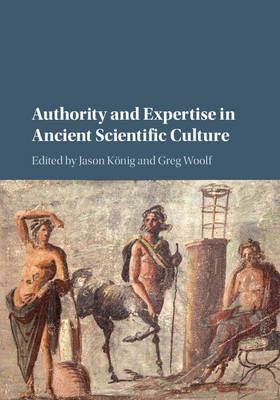
Authority and Expertise in Ancient Scientific Culture
Cambridge University Press (Verlag)
978-1-107-06006-7 (ISBN)
How did ancient scientific and knowledge-ordering writers make their work authoritative? This book answers that question for a wide range of ancient disciplines, from mathematics, medicine, architecture and agriculture, through to law, historiography and philosophy - focusing mainly, but not exclusively, on the literature of the Roman Empire. It draws attention to habits that these different fields had in common, while also showing how individual texts and authors manipulated standard techniques of self-authorisation in distinctive ways. It stresses the importance of competitive and assertive styles of self-presentation, and also examines some of the pressures that pulled in the opposite direction by looking at authors who chose to acknowledge the limitations of their own knowledge or resisted close identification with narrow versions of expert identity. A final chapter by Sir Geoffrey Lloyd offers a comparative account of scientific authority and expertise in ancient Chinese, Indian and Mesopotamian culture.
Jason König is Professor of Greek at the University of St Andrews. This is the third in a trilogy of volumes arising from a Leverhulme-funded research project, 'Science and Empire in the Roman World', which ran from 2007 to 2010 in St Andrews; the other two volumes, Ancient Libraries and Encyclopaedism from Antiquity to the Renaissance, were both published by Cambridge University Press in 2013. Greg Woolf is Professor of Classics and Director of the Institute of Classical Studies in London. He co-directed the project 'Science and Empire in the Roman World' at St Andrews and co-edited the two previous books resulting from it.
1. Introduction: self-assertion and its alternatives in ancient scientific and technical writing Jason König; 2. Philosophical authority in the Imperial period Michael Trapp; 3. Philosophical authority in the Younger Seneca Harry Hine; 4. Iurisperiti: 'men skilled in law' Jill Harries; 5. Making and defending claims to authority in Vitruvius' De architectura Daniel Harris-McCoy; 6. Fragile expertise and the authority of the past: the 'Roman art of war' Marco Formisano; 7. Conflicting models of authority and expertise in Frontinus' Strategemata Alice König; 8. The authority of writing in Varro's De re rustica Aude Doody; 9. The limits of enquiry in Imperial Greek didactic poetry Emily Kneebone; 10. Expertise, 'character', and the 'authority effect' in the Early Roman History of Dionysius of Halicarnassus Nicolas Wiater; 11. The authority of Galen's witnesses Daryn Lehoux; 12. Anatomy and aporia in Galen's On the Construction of Fetuses Ralph M. Rosen; 13. Varro the Roman Cynic: the destruction of religious authority in the Antiquitates Rerum Divinarum Leah Kronenberg; 14. Signs, seers and senators: divinatory expertise in Cicero and Nigidius Figulus Katharina Volk; 15. The public face of expertise: utility, zeal, and collaboration in Ptolemy's Syntaxis Johannes Wietzke; 16. The authority of mathematical expertise and the question of ancient writing more geometrico Reviel Netz; 17. Authority and expertise: some cross-cultural comparisons G. E. R. Lloyd.
| Erscheinungsdatum | 01.02.2017 |
|---|---|
| Zusatzinfo | 1 Line drawings, black and white |
| Verlagsort | Cambridge |
| Sprache | englisch |
| Maße | 180 x 254 mm |
| Gewicht | 1020 g |
| Themenwelt | Geschichte ► Allgemeine Geschichte ► Vor- und Frühgeschichte |
| Geschichte ► Allgemeine Geschichte ► Altertum / Antike | |
| Geschichte ► Teilgebiete der Geschichte ► Kulturgeschichte | |
| Naturwissenschaften | |
| ISBN-10 | 1-107-06006-0 / 1107060060 |
| ISBN-13 | 978-1-107-06006-7 / 9781107060067 |
| Zustand | Neuware |
| Haben Sie eine Frage zum Produkt? |
aus dem Bereich


